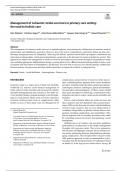Internal and Emergency Medicine (2024) 19:609–618
https://doi.org/10.1007/s11739-023-03445-y
IM - REVIEW
Management of ischaemic stroke survivors in primary care setting:
the road to holistic care
Hizir Ozdemir1 · Dimitrios Sagris1,2 · Azmil Husin Abdul‑Rahim1,3 · Gregory Yoke Hong Lip1,3,4 · Eduard Shantsila1,5
Received: 18 May 2023 / Accepted: 26 September 2023 / Published online: 24 October 2023
© The Author(s) 2023
Abstract
The management of ischaemic stroke survivors is multidisciplinary, necessitating the collaboration of numerous medical
professionals and rehabilitation specialists. However, due to the lack of comprehensive and holistic follow-up, their post-
discharge management may be suboptimal. Achieving this holistic, patient-centred follow-up requires coordination and
interaction of subspecialties, which general practitioners can provide as the first point of contact in healthcare systems. This
approach can improve the management of stroke survivors by preventing recurrent stroke through an integrated post-stroke
care, including appropriate Antithrombotic therapy, assisting them to have a Better functional and physiological status, early
recognition and intervention of Comorbidities, and lifestyles. For such work to succeed, close interdisciplinary collaboration
between primary care physicians and other medical specialists is required in a holistic or integrated way.
Keywords Stroke · Atrial fibrillation · Anticoagulation · Primary care
Introduction complications and prevention of recurrent stroke necessi-
tates a multidisciplinary approach from various healthcare
Ischaemic stroke is a major cause of long-term disability providers, including stroke specialists, general practitioners,
worldwide [1]. Advance in the medical management of cardiologists, internists, radiologists, speech and rehabilita-
stroke reduced stroke mortality and increased the number tion specialists, and psychologists. All these experts should
of people discharged home after a stroke [2]. For stroke sur- share goals and objectives following a common post-stroke
vivors and their families, hospital discharge is just the begin- integrated care plan to reduce cardiovascular morbidity and
ning of a long journey. Many stroke survivors experience mortality.
recurrent cerebrovascular events or complications within Due to a lack of holistic follow-up, stroke survivors and
months or years of their initial event [3]. Management of their caregivers may feel abandoned. Since general practi-
tioners (GPs) are the first point of contact with the healthcare
system in many countries, they are in an ideal position to
* Eduard Shantsila coordinate subspecialties to optimise chronic disease man-
Eduard.Shantsila@liverpool.ac.uk agement, including complications and comorbidities. They
1
Liverpool Centre for Cardiovascular Science at University play an important role in secondary prevention after stroke
of Liverpool, Liverpool John Moores University by controlling clinical risk factors and optimising overall
and Liverpool Heart & Chest Hospital, Liverpool, UK management.
2
Department of Internal Medicine, School of Health Sciences, Multiple pieces of evidence and speciality guidelines
Faculty of Medicine, University of Thessaly, Larissa, Greece guide primary care physicians in the complex management
3
Department of Cardiovascular and Metabolic Medicine, of people with a previous stroke. This review summarises
Institute of Life Course and Medical Sciences, Faculty this literature and highlights strategies for preventing recur-
of Health and Life Sciences, University of Liverpool, rent stroke, maximising function, and identifying and man-
Liverpool, UK
aging complications. This broadly follows the post-stroke
4
Department of Clinical Medicine, Aalborg University, ABC pathway approach, recently recommended in a posi-
Aalborg, Denmark
tion paper from the European Society of Cardiology Council
5
Department of Primary Care and Mental Health, University on Stroke [4]: A for Appropriate antithrombotic therapy, B
of Liverpool, Liverpool, UK
13
Vol.:(0123456789)
, 610 Internal and Emergency Medicine (2024) 19:609–618
for Better functional and psychological status, and C for clopidogrel, as standard [8, 9]. The combination of aspirin
Comorbidities and lifestyle, patient values and preferences and extended-release dipyridamole is still recommended in
(Fig. 1). secondary stroke prevention by current AHA/ASA (Ameri-
A move to an integrated care pathway approach has been can Heart Association/American Stroke Association)
advocated for many long-term conditions [5]. In patients guidelines [8]. However, the Royal College of Physicians’
with atrial fibrillation (AF), for example, adherence to an guidelines recommends a combination of aspirin and dipy-
integrated care pathway has been associated with improved ridamole only in patients who cannot tolerate clopidogrel.
clinical outcomes, leading to its recommendation in inter- However, this combination may be more difficult to tol-
national guidelines. [6, 7] erate, with a higher discontinuation rate than clopidogrel
[10]. Ticagrelor is a new potent P2Y12 inhibitor. Although
it may have a role in secondary stroke prevention, especially
[A]ppropriate antithrombotic therapy in patients with large artery intracranial atherosclerosis and
after recurrent events [11] the evidence of its effectiveness
Antithrombotic therapy is the backbone of secondary stroke and safety is limited and should be initiated by secondary
prevention based on the underlying potential stroke aetiol- care [8]. The role of cilostazol in patients with a previous
ogy and the individualised indications or contraindications. stroke as monotherapy or in addition to aspirin or clopi-
It is an essential component of an integrated care pathway dogrel has been investigated in RCTs, providing promising
for stroke management. results, but these studies only aimed Asian population, thus
limiting their generalizability [12, 13].
Antiplatelet therapy Although long-term dual antiplatelet with aspirin and
clopidogrel is contraindicated in patients with ischaemic
Antiplatelet therapy is the standard antithrombotic strategy stroke due to the increased risk of major bleeding [14], in
in most patients with non-cardioembolic ischaemic strokes. patients with minor stroke (National Institutes of Health
Current guidelines suggest long-term antithrombotic therapy Stroke Scale [NIHSS] ≤ 3) or a high-risk transient ischaemic
with a single antiplatelet agent, either low-dose aspirin or attack (ABCD2 ≥ 4), the use of dual-antiplatelet therapy for
Fig. 1 Management of post-stroke patients based on ABC pathway normalised ratio, DOAC direct-acting oral anticoagulant, LAA left
approach. TIA transients ischemic attack, ESUS embolic stroke of atrial appendage, AF atrial fibrillation, OAC oral anticoagulant,
undetermined source, VKA vitamin-K antagonists, INR international PFO patent foramen ovale
13




